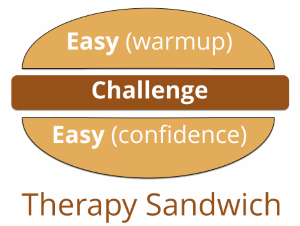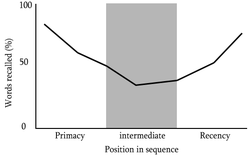Motivating Stroke Survivors with a therapy sandwich
How caregivers can challenge speech-language survivors during treatment, without discouraging them.
 Start by helping the patient choose the goal: after all it's their therapy. But some patients start at an over-challenging level and quickly become frustrated. Or they stay at an easy level & avoid challenge (which is necessary to make progress.) In those cases, communicate with the survivor about how they are feeling and what their goal is. Let them know you are not judging them and are just helping them navigate those feelings.
Start by helping the patient choose the goal: after all it's their therapy. But some patients start at an over-challenging level and quickly become frustrated. Or they stay at an easy level & avoid challenge (which is necessary to make progress.) In those cases, communicate with the survivor about how they are feeling and what their goal is. Let them know you are not judging them and are just helping them navigate those feelings.
This three step method warms up the patient with success, then challenges them (this is the meat of the treatment), and then finishes with something easier so they finish with success.
"It really is a good way to do it so you don't get flustered."
- Shirlene Cooper, stroke-survivor
- WARMUP : Find a level that they can succeed at (90-100% accuracy* ). This gets them comfortable with the exercise and how it works. It also gives them some emotional momentum and confidence.
They'll need that for step 2.
*90-100% is a guideline. The goal is that they feel successful. - CHALLENGE: Work at a level that is a challenge for them (something around 60-90% accuracy). This is the meat of our Therapy Sandwich and I suggest spending most of the session time at this level. This is where you strain the brain. No strain, not gain. We want to challenge them.
- FINISH WITH SUCCESS: Go back to the level in #1.
The idea here is that they are more likely to remember the success of step 1 and 3 than the challenge of Step 2.
Now that you know how to make Therapy Fun, 
ready for some free therapy materials?
Free Speech-Language Treatment Course
Every day is an opportunity for recovery. Don't miss a single day. I'll provide you the tools & knowledge for faster speech & language recovery
- How brain plasticity makes recovery possible even years later.
- Why just-work-harder is a recipe for failure
- The 4 types of Speech-Language Skills,
and how to assess which are affected. - Printable worksheets for home practice
Clay Nichols
Co-founder of MoreSpeech and Bungalow Software that both provide Speech & Language Software
 For over 20 years, Clay has helped patients, caregivers and speech pathologists with speech & language software. He shares the tips & tricks he's picked up along the way.
For over 20 years, Clay has helped patients, caregivers and speech pathologists with speech & language software. He shares the tips & tricks he's picked up along the way.
Clay is not a speech pathologist.
But he consults with the speech pathologists he works with (and has them review the blog articles). You should consult your speech therapist regarding any tips you read anywhere, including the Rehab Resources.
 The Recency Effect causes us to remember the most recent part of an activity. For example, we'll often remember how felt about the end of a movie more than the middle.
The Recency Effect causes us to remember the most recent part of an activity. For example, we'll often remember how felt about the end of a movie more than the middle.